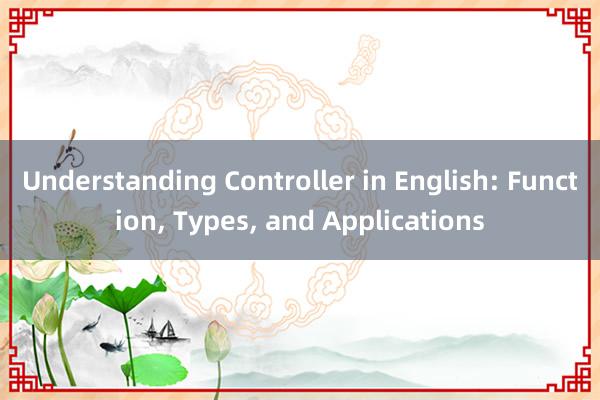
### Understanding Controller in English: Function, Types, and Applications
In the realm of software engineering, particularly within the context of system architecture and user interface design, the concept of a controller plays a pivotal role. This article aims to demystify the function, types, and applications of controllers in English, providing insights for developers, designers, and engineers across various domains.
#### Function of Controllers
At its core, a controller serves as an intermediary between the model (the data or state of the system) and the view (the user interface). Its primary function is to orchestrate the flow of information and actions between these two components. By doing so, it ensures that the application responds dynamically to user inputs while maintaining the integrity and coherence of the underlying data model.
#### Types of Controllers
Controllers can be broadly categorized based on their functionality and application scope:
1. **Business Logic Controllers**: These controllers handle the business logic of an application. They process data, perform calculations, 个人网页测试 and manage transactions without directly interacting with the user interface. They ensure that operations are performed correctly according to the application's rules and policies.
2. **Presentation Controllers**: Focused on the user interface,气达利有限公司 these controllers manage how data is displayed and interacted with by the user. They interpret user input and decide which views should be updated or rendered next.
3. **Model-View-Controller (MVC) Frameworks**: MVC is a widely used architectural pattern where the model represents the data and business logic, 张家口市进出口有限责任公司 the view displays the data, and the controller manages the interaction between them. MVC frameworks like Ruby on Rails, Django, and AngularJS exemplify this approach,其仝软件 offering a clear separation of concerns and promoting maintainability and scalability.
4. **IoC/DI Containers**: These are not strictly controllers but play a crucial role in managing dependencies among components. They inject services into classes at runtime, allowing for loose coupling and easier testing.
#### Applications of Controllers
产后修复加盟招商 - 产后修复排行榜_品牌产后修复加盟 专业高效的招商加盟平台Controllers find applications across diverse fields:
1. **Web Development**: In web applications, controllers are central to handling HTTP requests, processing them, and rendering appropriate responses. They facilitate the dynamic updating of web pages without requiring a full page reload.
2. **Desktop Applications**: Similar to web applications, desktop controllers manage interactions between the user interface and the underlying logic, ensuring smooth operation and responsive behavior.
3. **Mobile Applications**: In mobile development, controllers (often referred to as view controllers) are essential for managing the flow of data and user interactions on devices with limited screen real estate and input methods.
4. **Game Development**: Controllers in games manage player input, game state, and interactions, providing a seamless gaming experience.
5. **IoT and Embedded Systems**: In the realm of IoT and embedded systems, controllers manage device interactions with the environment and other devices, facilitating communication and control protocols.
In conclusion, understanding the function, types, and applications of controllers is fundamental to developing robust, efficient, and user-friendly applications across various domains. Whether it's managing data flow in a web application其仝软件, orchestrating interactions in a game, or coordinating device operations in IoT, the role of controllers is indispensable in modern computing environments.
